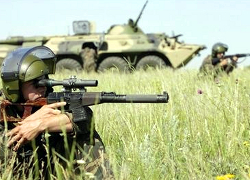Rzeczpospolita: Poland should expect attack from Belarus
- 30.04.2014, 17:04
- 3,419

One cannot believe the post-Kyiv statements by Lukashenka.
Poland has focused on Ukraine and forgotten Belarus, a semi-independent and always faithful satrapy, which is an almost ideal state for the Kremlin. If it happens to Warsaw to meet a threat of Russian military aggression, it will come from Belarus (or the Kaliningrad region), but not from Ukraine, Andrzej Talaga writes for Rzeczpospolita.
One should not be deceived by Lukashenka's post-Kyiv statements and the demonstration of his independence from Moscow. His satrapy in the geopolitical play is one of Russia's far western strongholds. In the long term, Poland should pay as much attention to Belarus as to Ukraine.
From the Kremlin's point of view, Belarus differs from Ukraine (not only the current one, but of that under Viktor Yanukovych's rule) in a good sense. Firstly, it lacks identity. It doesn't have historical state formations it could refer to. The Great Duchy of Lithuania with old Belarusian and later Polish culture doesn't suit. Today's Belarusian identity consists of sovietism, the “we are the local” feeling and the cult of the World War II. Neither the Belarusian language nor folk culture plays the integration role.
In these conditions, it was easy for Lukashenka to create a state just for one person that can be turned into a dynastic state, if he hands over the power to his son. It won't be unusual in the post-Soviet area: Azerbaijan, which doesn't have strong historical base, too, developed a similar state system. Unlike Azerbaijan, Belarus doesn't have oil and gas, and therefore doesn't have chances for economic independence. It even lost control over the country's transit infrastructure, and Russia has become the main (and the only in some industries) recipient of its exports. The current political system in Minsk can work only on Russia's will. But Moscow does not believe the satrap: it didn't allow him to modernise the army, especially the air forces, refused to issue loans for purchasing modern military equipment. As a result Lukashenka has badly trained and poorly equipped armed forces, which structure, mentality and training methods remain deeply Soviet. Without Russia's help, they have no chances of winning a hypothetical war, for example, with Poland. However, it doesn't apply to the air defence forces, which, being Russia's first defence line to repel aviation and missile attacks, are fully integrated in the Russian air defence system.
In this situation, Lukashenka bravery in what concerns the territorial integrity of Ukraine, condemning the idea of federalisation of the country and recognising the Kyiv authorities come as a surprise. It even encouraged Polish prime Minister Donald Tusk to talk with the Belarusian ruler, which became his first conversation with a EU member leader since the dispersal of the peaceful demonstration in Minsk after the 2010 election.
But Lukashenka's deeds stay from from his declarations. He broke the promise given to foreign ministers of Poland and Germany about political repressions and internal reforms. However, he was not the only one who did it. The story of Yanukovych in the context of the release of Yulia Tymoshenko and signing the association agreement with the EU is illustrative: He said one thing, but did another. Words of post-Soviet satraps do not have the goals and meaning that words in civilised countries have. They are rather tools of current policy than statements that oblige to something.
Whatever Lukashenka may say, he will continue obeying Moscow in strategic issues, and the 400 kilometers of the Polish-Belarusian border will remain a through-passage for the Russian troops in case they want to move to the west.
The ousting of the satrap by street protests, if it ever takes place, cannot solve the problem. To make Poland safe from a treat from Belarus, Minsk would have to review its economic relations and hold fundamental domestic reforms, as well as (for the lack of strong national identity) to build the state idea based on European integration. Taking into account the previous failures, the task seems to be beyond the possibilities of Poland, but we shouldn't forget it. Constant dropping wears away a stone, as a proverb says, and it is a matter of our elementary security.








